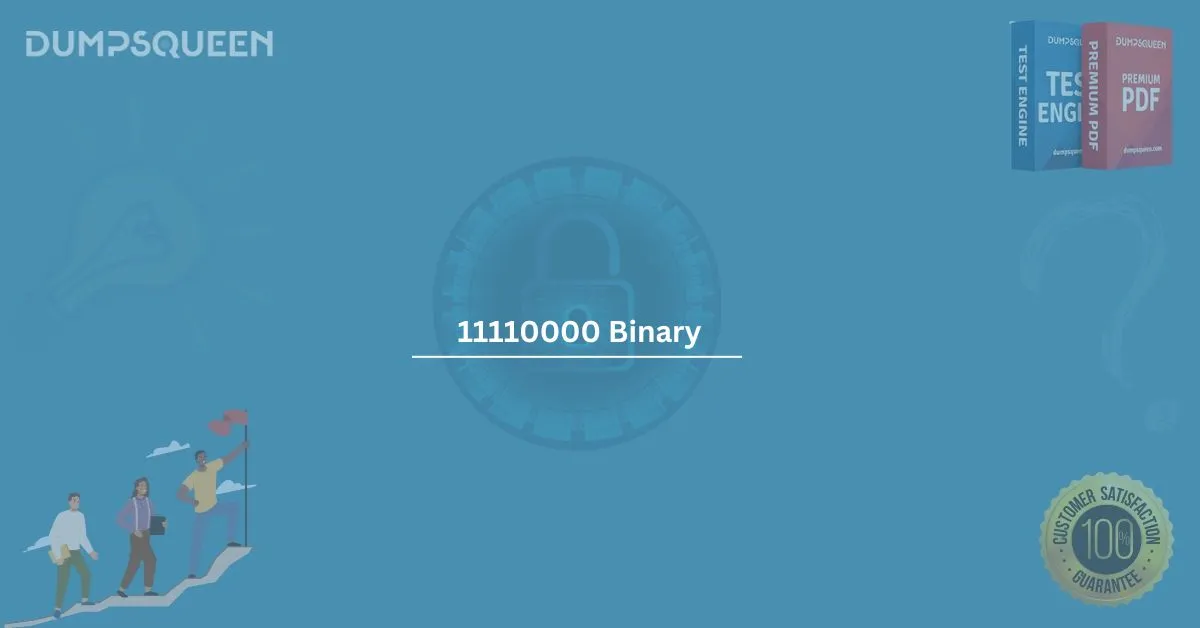The binary number system is fundamental to computing and digital electronics. It is the language through which computers and digital systems understand and process data. In this guide, we will dive into the specifics of 11110000 binary, explaining its conversion to decimal and hexadecimal, its relevance in various fields, and how it fits into your exam prep for certifications like CompTIA and Cisco.
What is Binary?
Binary is a base-2 numeral system, meaning it uses only two digits: 0 and 1. Every binary digit, or bit, represents an increasing power of 2, with each place value being double the previous one. This system is crucial for computing because computers use transistors that have two states: on (1) and off (0).
Breaking Down 11110000 in Binary
To understand 11110000 binary, let's first explore its decimal equivalent. The number 11110000 is an 8-bit binary number. Each digit in binary represents a power of 2, with the rightmost digit (the least significant bit) representing 2^0, and the leftmost representing 2^7. Here’s how it works:
1 1 1 1 0 0 0 0
128 64 32 16 8 4 2 1
To convert it to decimal, we add up the values of the positions where there is a 1:
128 + 64 + 32 + 16 = 240
So, 11110000 binary equals 240 in decimal.
Converting 11110000 Binary to Hexadecimal
Binary can be easily converted to hexadecimal. Hexadecimal is a base-16 numeral system, and it is commonly used in computing because it simplifies the representation of binary data.
To convert 11110000 to hexadecimal, we first break it into nibbles, which are 4-bit segments. This results in:
yaml
1111 0000
Now, each nibble can be converted to its corresponding hexadecimal value:
- 1111 in binary is F in hexadecimal
- 0000 in binary is 0 in hexadecimal
So, 11110000 in binary equals F0 in hexadecimal.
Real-World Applications of 11110000 Binary
Understanding 11110000 binary and binary in general is essential for various fields in technology, particularly networking and computing. Here are some areas where it is relevant:
- Networking: In networking, subnetting involves working with binary numbers. A subnet mask such as 255.240.0.0 is represented in binary as 11110000 00000000 00000000, which helps in determining network and host portions of an IP address.
- Operating Systems: Binary numbers like 11110000 are used in file permissions and memory addressing. For example, binary values are often used to set or modify access rights for files and directories.
- Programming: Understanding binary is crucial for programmers, especially when dealing with low-level operations like bitwise manipulation, data compression, and encryption.
Exam Prep: 11110000 Binary in Certification Exams
When preparing for certification exams like CompTIA Network+ (N10-008) or Cisco CCNA (200-301), binary numbers play a critical role. These exams test your understanding of IP addressing, subnetting, and network protocols, all of which require a strong grasp of binary number conversions and operations.
For instance, subnetting often involves converting IP addresses and subnet masks into binary, performing binary arithmetic, and then interpreting the results. Understanding how to quickly and accurately convert numbers like 11110000 binary to decimal and hexadecimal will save you valuable time during the exam.
At DumpsQueen, we offer comprehensive Exam Prep Dumps and Study Guide material that cover all aspects of binary numbers, subnetting, and other key topics related to networking certifications. Our resources include practice exams, study notes, and hands-on exercises to help you master these concepts.
Conclusion: Mastering 11110000 Binary for Exam Success
Understanding the binary number 11110000 and its applications in networking and computing is essential for passing certification exams like CompTIA Network+ (N10-008) and Cisco CCNA (200-301). At DumpsQueen, we provide the necessary Exam Prep Dumps and Study Guide material to help you succeed in your exams. Whether it’s binary conversion or subnetting, our resources are designed to give you the edge in your studies.
Make sure to practice regularly with binary numbers like 11110000, and utilize our study guides to reinforce your understanding. With the right preparation, you can confidently tackle any question related to binary and networking in your certification exams.
Sample Questions for Practice
To help you prepare for your exam, here are some multiple-choice questions based on the 11110000 binary concept:
Question 1: What is the decimal equivalent of the binary number 11110000?
A) 120
B) 255
C) 240
D) 128
Correct Answer: C) 240
Question 2: Which hexadecimal value corresponds to the binary number 11110000?
A) A0
B) F0
C) 1F
D) FF
Correct Answer: B) F0
Question 3: Which of the following binary strings has the same number of 1s as 11110000?
A) 11000011
B) 00001111
C) 11100000
D) 11111111
Correct Answer: C) 11100000
Question 4: If a subnet mask is written as 240 in decimal, what is its binary form?
A) 11100000
B) 11110000
C) 00001111
D) 11001100
Correct Answer: B) 11110000



